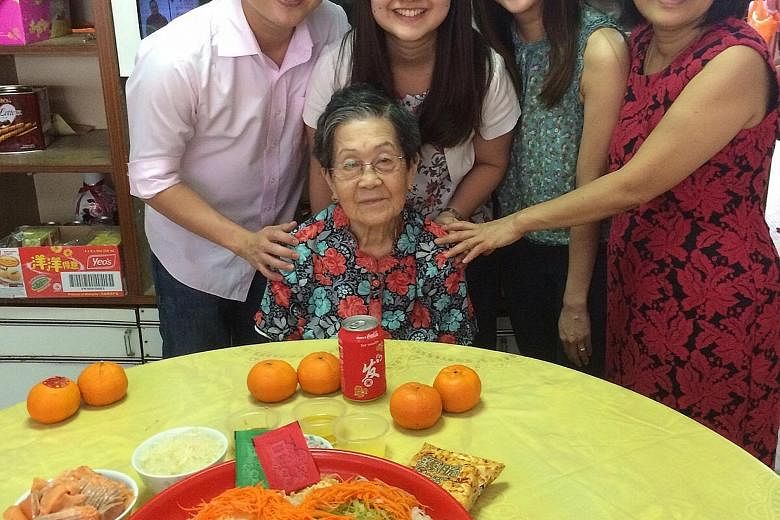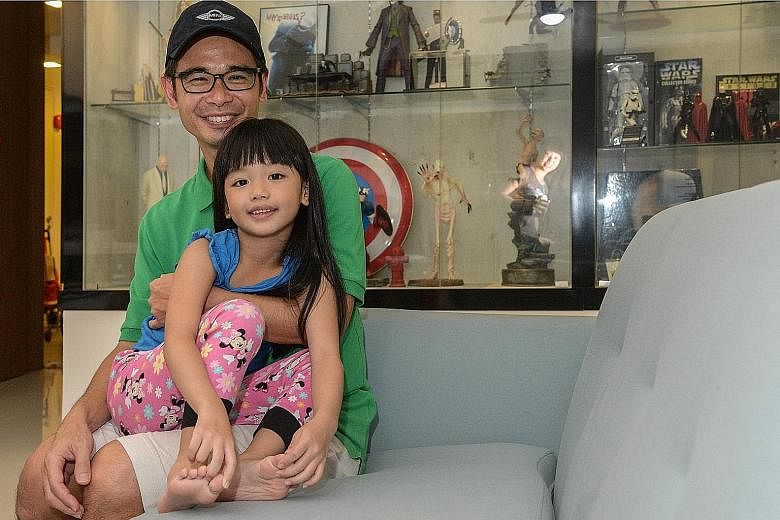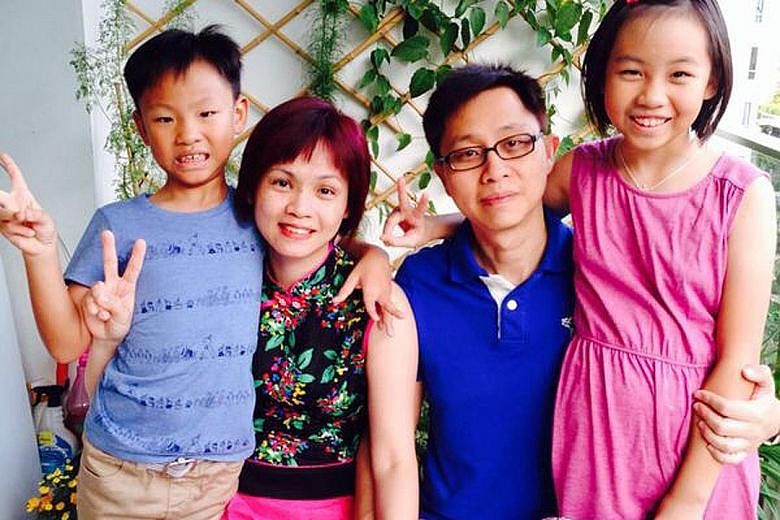Financial analyst Benedict Lo always felt a sense of regret that he could not "really connect" with his maternal grandparents whenever he visited them during Chinese New Year.
They speak Hainanese, a Chinese dialect he could not speak or understand a word of.
So, when his maternal grandfather was diagnosed with dementia and then suffered a fall in 2013, Mr Lo decided not to waste any more time.
Early last year, the 31-year-old engaged a tutor to teach him Hainanese for an hour once a week.
He says: "I still can't speak it well, but at least I can now hold a simple conversation with them. I can tell they really appreciate the effort. If I make a mistake in the pronunciation, they would laugh and correct me."
Many young people who sign up for Chinese dialect classes at clan associations here do so because they want to xun gen, or explore their roots.
A number also want to connect with the older people in their family or at work.
Mr Lo and his younger sister grew up speaking Mandarin to their mother, a Hainanese, and English to their father, a Cantonese.
Their parents had adhered to the government policy of phasing out dialects following the launch of the Speak Mandarin campaign in 1979.
The campaign had its origins in the late founding prime minister Lee Kuan Yew's conviction that people could not cope with learning English, Mandarin and dialects at the same time.
When Mr Lo worked in Hong Kong from 2010 to 2012, he attended weekly classes in Cantonese. At first, he learnt the dialect so he could get around, but he developed an interest in it.
After he returned to Singapore, he engaged a private tutor to learn it for another year.
He says: "I grew up listening to my aunt lamenting how it's a pity that although we, the younger generation, are Cantonese, we have lost our mother tongue and don't know our roots. As I grow older, I find myself agreeing with her."
Mr Nigel Lim, 63, has been conducting Teochew classes at the Teochew Poit Ip Huay Kuan since 2000. He says most of the students who sign up these days are in their 20s to 40s.
He says: "They come because they want to know their roots. They find it embarrassing that they cannot speak their dialect."
Mr Lim sees a growing interest in the dialect. He used to teach five to six weekly classes every year, but demand has grown such that he can now teach up to 10 classes a year.
To expose more young people to the Hakka dialect, Char Yong (Dabu) Association ran its first Hakka-speaking class in December 2013. The 30 spots for the class, which was held over eight sessions, were filled up quickly.
About a third of those who signed up were accompanied by their parents, who wanted them to know their family dialect.
One of them was project manager Lee Mee Nee, who grew up speaking Hakka and Hokkien to her parents. Ms Lee, who is in her early 40s, attended the class with her two children aged 11 and nine.
She says: "I wanted them to know the dialect I grew up with, otherwise it will just die with us."
Even though the course was too short for her children to start speaking Hakka to her, she felt the exposure was good.
She says: "At least they learnt to appreciate a different tongue that is spoken by their parents and elders."
She and her husband also encourage their children's main caregiver, her mother-in-law, to speak to them in her dialect, Teochew.
Civil servant Sebastian Tan, 41, and his wife, too, have been urging their daughter's main caregiver, Mrs Tan's mother, to speak to her in Hokkien.
Says Mr Tan: "It's good for her to know her roots. We also want her to be able to interact with her great grandparents, whom we visit every other week. They speak only Hokkien."
He does not think speaking dialect will cause his daughter to perform poorly in English and Chinese in school.
Associate professor Foo Tee Tuan, deputy director of the UniSIM Centre for Chinese Studies at SIM University, agrees: "The brain can handle more languages than people think. But the environment has to be conducive."
Citing his own experience, professor Foo, 53, who grew up in a Mandarin-speaking family, says he picked up Mandarin and three Chinese dialects without much effort as a child.
He says: "I played with neighbours who spoke Hokkien, watched Hong Kong television series in Cantonese and spoke Hainanese with my grandparents. But such an environment is uncommon today."
Although the opportunities to learn dialects these days are harder to come by, some still exist.
Polytechnic graduate Lim Ming Yi, 20, could not speak Hokkien until her mother registered her for music classes at the traditional arts organisation Siong Leng Musical Association 10 years ago.
There, she learnt to play the pipa as well as sing songs in the Min Nan dialect, which is similar to Hokkien.
Ms Lim, who is in charge of outreach and education at the association, can now speak Hokkien well enough for her to trade stories about her day with her 77-year-old grandmother every evening.
She says: "Now that I can communicate with my grandmother, she is no longer just someone who cooks my dinner and cares for me. She has also become a friend, someone I can share my woes and happiness with."
As her grandmother is able to express herself more freely and naturally to her in Hokkien, Ms Lim says she can understand her on a deeper level.
"The stories she tells me about her past are something that money cannot buy and will be forever etched in my memory."



